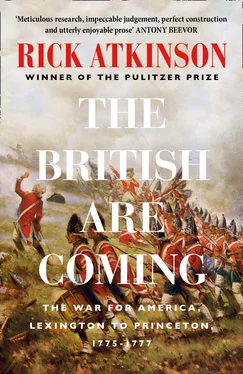The king’s resolve was unshaken. He still believed that “with firmness and perseverance America will be brought to submission.” Others in England were less sanguine. The government was unable to offer a coherent rejoinder to the American claims except to plead for “a suspension of belief.” “This looks serious,” Edward Gibbon wrote, “and is indeed so.”
The news of Concord “flew like wildfire and threw the whole Continent into a flame,” Horace Walpole told his journal. “Bitter invectives were published every day against the governing party.” The guard at St. James’s Palace reportedly was doubled. Even staunch supporters of North’s regime felt bewildered. “All my prejudices are against the Americans,” the theologian John Wesley wrote Lord Dartmouth, but “waiving all considerations of right and wrong, I ask is it common sense to use force toward the Americans?” Gage’s laconic, tardy version of events, sent aboard the sluggish brig Sukey , did not arrive in England until June 9; the commander in chief’s dispatch, only four paragraphs long, hardly reassured his monarch, his government, or his fellow Englishmen, particularly since he closed by noting, “Several thousand are now assembled about this town, threatening an attack and getting up artillery, and we are very busy making preparations to oppose them.”
Preparations also continued in the American camp. Citizens in Concord retrieved cannons and musket balls from millponds, thickets, and various hiding places. A seven-year-old in Braintree named John Quincy Adams later recalled how militiamen “took the pewter spoons out of our kitchen to melt them into bullets.” Men in Menotomy pried the shoes from the four horses killed while pulling Percy’s ill-fated supply wagons. A scavenged red coat was draped across a brace of sticks in a greening field as both a scarecrow and a warning. On the Sunday following the battle, and for many Sundays to come, preachers drew from Lamentations to remind parishioners that their suffering reflected divine judgment on their own imperfections: “The joy of our heart is ceased. Our dance is turned into mourning.”
Yet many also felt vibrant, even exhilarated, and aware that “something clear and fine” had transpired, as the historian Allen French would write a century and a half later. They were now swept up in events grander than themselves, in “the meeting of strong men, at the beginning of great things.”
True enough. But something opaque and awful also had happened, a fraternal bloodletting. The enmity of recent years had curdled into hatred. Young men had died in agony, as befell young men in war, and many, many more were still to die. One of them was Lieutenant Edward Hull of the 43rd Foot. Shot at North Bridge, then shot again in a chaise ambulance during the retreat through Menotomy, Hull had been left behind in rebel care. A day after the battle, Reverend McClure found the young Scot in obvious anguish from three bullet wounds, yet still “of a youthful, fair, and delicate countenance.” Sprawled across a feather bed in Samuel and Elizabeth Butterfield’s house near Cooper’s Tavern, he wore a greatcoat and fur hat provided by his captors, since his own men had stripped him of his tunic, waistcoat, and shirt before the militia snatched his shoes and buckles. His bloody breeches lay beside him on the bed, and he sucked on an orange donated by a neighbor. “I asked him if he was dangerously wounded,” McClure wrote. “He replied, ‘Yes, mortally.’” Lieutenant Hull would linger for nearly two weeks in a twilight of pain and remorse; then, on May 2, he “took heaven by the way,” as the expression went. Six rebel officers escorted his coffin to the Charlestown ferryway, where British bargemen rowed him to Boston for burial.
He, at least, would be drummed into the next world. The graves of many others remained unmarked and unremembered, except for the long bones and the ribs and the skulls that over the years pushed to the surface in Middlesex meadows and woodlands, memento mori from one raving afternoon on Battle Road.
3.
I Wish This Cursed Place Was Burned
BOSTON AND CHARLESTOWN, MAY–JUNE 1775
An army of sorts soon bivouacked along a ten-mile crescent from Roxbury to Chelsea, determined to serve the god of battle by driving the British into the sea. In late April, the provincial congress called for thirty thousand American troops to turn out, and legions left farm, shop, and hearth, including one patriot and his three sons who hurried from their sawmill without even bothering to shut the gate. Two thousand were said to march from New Hampshire. Forty-six of Connecticut’s seventy-two towns sent men, and classes at Yale College were canceled for lack of students. “The ardor of our people is such that they can’t be kept back,” a committee in New Haven informed John Hancock. A woman in Philadelphia wrote, “My only brother I have sent to the camp.… Had I twenty sons and brothers, they should go.”
The Essex Gazette would name this host the Grand American Army, though William Tudor, a protégé of John Adams’s who soon would serve as judge advocate, called it “little better than an armed mob.” Houses abandoned by loyalist families in Cambridge were confiscated for barracks and officers’ billets. Eleven hundred tents accumulated by the Committee of Supply sprouted along the Charles, and a request went out to sailmakers and ship masters for more. “We have stripped the seaports of canvas to make tents,” a member of the provincial congress reported. Any man who enlisted fifty-nine others into a company qualified for a captaincy; any captain who organized ten companies might be designated a regimental colonel.
Drums beat reveille daily at four a.m., and after roll call the men marched to morning prayers. “The camp abounds with clergymen,” one soldier wrote, and more than a dozen local divines volunteered their services for regiments without chaplains. Officers were empowered to suppress “tumults” in the ranks, to confine men to their tents after evening tattoo, and to shutter grogshops selling liquor to the troops. The smells of encampment grew ripe—wood smoke, roasting meat, imperfectly dug latrines. Soldiers cast new bullets with molding tools, fashioning cartridges from paper scraps and thimbles of powder. A homesick soldier hanged himself in a barn. “I went down & saw him,” a private noted in his journal, then added, “I went home & took a nap.” More rumors flew, including a pastor’s warning in early May to beware “lest General Gage should spread the smallpox in your army.”
No sooner did the Grand American Army muster than it began to melt away. Farmers left to tend their spring fields, shopkeepers to tend their counters. Most Connecticut troops soon wandered home, discouraged by the shortage of provisions around Boston. The force would dwindle to sixteen thousand or so within a month after the shots at Lexington, although no one was sure of the number. “As to the army, it is in such a shifting, fluctuating state,” a Committee of Safety member wrote. “They are continually going and coming.” To deceive the British in mid-May, a brigade of seven hundred men in Roxbury marched round and round a hill to feign preponderance; a mile-long column of more than two thousand marched from Cambridge to the Charlestown fish market, bared their fangs across the Charles, then marched back.
Shortages extended beyond canvas and rations. “We are in want of almost everything, but of nothing so much as arms and ammunition,” Joseph Warren wrote on May 15 to Philadelphia, where the Second Continental Congress had just convened. Massachusetts counted thirty-eight cannons, mostly inferior iron guns. Rhode Island sent a few brass fieldpieces to the siege line, but they hardly sufficed to confront the British Empire. In mid-month, welcome news arrived from Lake Champlain in New York, more than two hundred miles northwest: at three-thirty a.m. on May 10, eighty-five whooping New England roughnecks, later described as “tatterdemalions in linsey-woolsey who call themselves Green Mountain Boys,” had swarmed from a scow-rigged bateau to overrun the British garrison at Fort Ticonderoga.
Читать дальше












